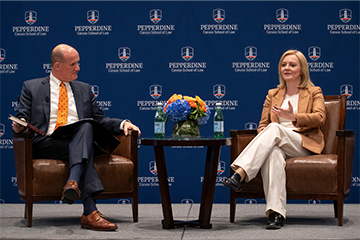Former British Prime Minister Liz Truss Discusses New Book at President’s Speaker Series

On Thursday, April 25, 2024, president Jim Gash (JD ’93) welcomed Liz Truss, the 56th prime minister of the United Kingdom and current member of Parliament, to Malibu as the final guest of the President’s Speaker Series of the academic year.
In an interview with President Gash before a live audience of 350 at the Caruso School of Law auditorium, the former prime minister discussed her latest book, Ten Years to Save the West. Truss shared her insights about the significant ideological and geopolitical challenges she faced as a head of state, as well as observations on the cultural influence the US has on the rest of the world. The event marks the first time a former British prime minister has visited Pepperdine’s Malibu campus.
President Gash began the conversation by inquiring about the significance behind the title of Truss’ book, Ten Years to Save the West. “It’s in the interest of our enemies to see [the West] question ourselves and question our own society,” she said. “That is the threat that we face, and I think we are getting close to a tipping point.”
 The goal of the President’s Speaker Series is to invite prominent thought leaders
to Pepperdine’s campus so, according to President Gash, “they can interact with our
students, our faculty, and our staff to inspire, to challenge, and to encourage civil
dialogue about the issues of the day.” Previous guests have included Tani Cantil-Sakauye,
former chief justice of the California Supreme Court; David Schenker, former assistant
secretary of state for Near Eastern affairs; Richard Haass, former president of the
Council on Foreign Relations, and Rabbi Ari Berman, president of Yeshiva University.
The goal of the President’s Speaker Series is to invite prominent thought leaders
to Pepperdine’s campus so, according to President Gash, “they can interact with our
students, our faculty, and our staff to inspire, to challenge, and to encourage civil
dialogue about the issues of the day.” Previous guests have included Tani Cantil-Sakauye,
former chief justice of the California Supreme Court; David Schenker, former assistant
secretary of state for Near Eastern affairs; Richard Haass, former president of the
Council on Foreign Relations, and Rabbi Ari Berman, president of Yeshiva University.
Truss cited current movements and ideologies as key elements of the “New Left” that are threatening the West. “Our society is being undermined by crazy ideas that people wouldn’t subscribe to a few decades ago,” she said.
Truss also pointed to the rise of authoritarian states such as China, who is now working with Iran and Russia. “Because the West hasn’t shown enough strength, we are experiencing increasing belligerence [from the East],” she said.
Truss went on to reflect on her upbringing and shared her unexpected journey to conservative politics. “I grew up in a left-wing household, and my mother was an anti-nuclear campaigner,” said Truss. “It was only when I got to university and started studying economics that the scales really dropped. I thought conservatives were actually right.”
When prompted to share her thoughts about her brief stint as prime minister, Truss quipped, “In historical terms, it’s unmatched.” Truss noted she faced many challenges outside of her control and pointed to the administrative state as the most significant barrier to advancing conservative policies on which she was elected. “Power that used to be democratically accountable has now been outsourced to unelected bodies,” said Truss. “When the decision gets so far removed, that's what [elected officials] are facing.”
Turning her attention to US politics, Truss drew parallels between the political dynamics in both the UK and the US. According to Truss, American conservatives are facing similar challenges. “Look at the House of Representatives,” she said. “Look at what’s going on with your [House] speakers. It is exactly the same dynamic.”
Truss recognized the progress the two nations have made in advancing individual rights and the rule of law, from the Magna Carta to the US Constitution, concluding with a point of British pride. “I like to say the US is Britain’s greatest invention,” she said.
On the topic of foreign relations, Truss scorned the influence of international bodies such the International Monetary Fund, World Bank, and the United Nations. She argued these institutions severely restrict freedom of individuals and the sovereignty of the nation-state. “What I favor is a coalition of national-states who want to promote our values and our own ideas,” said Truss. “Too often these bodies are created with no purpose, and they tend to create their own.”
For his final question, President Gash invited Truss to share her advice on how students should engage in “making the world more reflective of their [own] values,” acknowledging that there were those in the audience who agreed and those who disagreed with her on the issues.
“I feel that we need people of talent, vision, and principles to be prepared to enter the political fray,” Truss said. “I think it’s an honorable career, I really do.”
Watch the full-length broadcast of Truss’ discussion, as well as previous President’s Speaker Series events, on the President’s Speaker Series website.